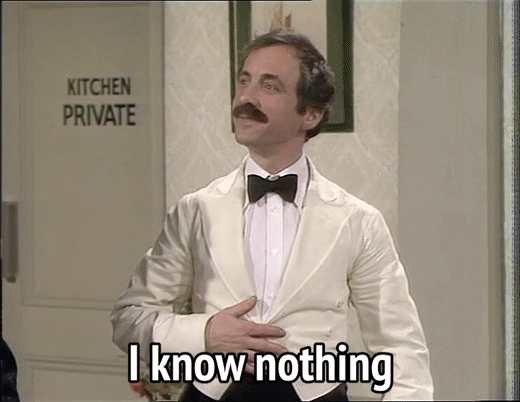Let’s start with something – I love what I do and I’m so lucky to be able to say that. Not everyone loves their job, but I do. Having said that, it’s simultaneously the most satisfying and the hardest thing I’ve ever done.
In this post, I want to share a few things I’ve learned (good and not so good) over the last five years or so. Having written these things down, I’ve realised that this is just as much about what I’ve learned about myself – hopefully that’s still useful to others!
You think you know it all, you don’t
Looking back five years to when Aira officially started, I knew nothing. But not in the way I expected.

I was expecting to learn a lot. After all, I was going to be running a company and trying to work with a brand new team and business partner. I knew that I didn’t know that much about running a business and that I was going to learn loads, it was a given and it was part of the reason I was doing this. I expected to learn loads about “business”.
I didn’t expect to learn as much as I have about me.
I thought I knew myself pretty well. I’d been in the industry professionally for 7-8 years, worked with a bunch of teams, different kinds of people and clients and put a lot into my personal development.
I thought I knew how I reacted to and handled different situations but the thing is, it’s different when your own business is on the line. You react differently and think differently. Running a business tests you in a bunch of ways and forces you to learn quickly because if you don’t, the consequences go beyond your own career and into others.
For me, I’ve learned a lot about:
- What makes me happy (truly happy) at work
- What stresses me out and causes anxiety
- What tiny, usually insignificant things can ruin my day
- What I truly enjoy doing every day
- What my mental health really means
In the end, I know that I’ve learned a lot about “business”. But I’ve learned even more about myself and how I react to and handle an infinite number of situations.
Self-awareness and knowing where your head is at is crucial
Leading on from the point above, I’ve learned a lot about what makes me happy, sad, stressed or anxious. If I’m making a key decision about something and my head isn’t in the right place, the consequences could be huge and affect more than just me.
The truth is, your head can’t be in the right place 24/7. There are going to be times when you’re not in the best mindset to be making important decisions. The key is to understand when these situations occur and know how to handle them, or snap yourself back into the right mindset.
For me, I know that I can get a little moody if I’m in the middle of a work stream and have to step out of it unexpectedly, This doesn’t always happen and generally, I can move my head into the right place quickly. But there is the odd occasion when I can’t just do that. An example could be if someone puts a last minute meeting in my calendar in the middle of what I thought may be a clear afternoon to get stuff done. If the stuff I’m doing has been outstanding for a while, I’m a bit more likely to not welcome the interruption.
Again, interruptions can happen and that’s normal. But I now know that if this happens, I need to be aware of a few things:
- Am I in the right mindset to instantly drop my work and help someone with something? If I am, no problem.
- If I’m not sure about where my head is at, push back on whether I’m needed right now. If not, can we chat later or another time? If so, I can keep my head in my current work but still help the person.
- If I am needed at that time, I need to put my work down in a place where I can come back to it and on the walk from my desk to a meeting room, grab a drink and tell myself that the other person needs (and deserves) my full, present attention.
On the last point, it’s basically a short 30 second mental mindset shift. It’s the kind of thing that on most occasions, I just do without thinking. But after a while of running Aira, I recognised that my mind can’t always make that shift.
How did I learn this?
I think this was when I found myself getting a bit grumpy during a meeting or giving an answer to something which I knew I hadn’t really thought through properly. I started to think about why this happened and eventually I noticed patterns and I learned this about myself.
There is a secondary, important point here. You have to keep this awareness high at all times – know how you respond to someone or something in a way which isn’t quite “you”. In addition, find someone who knows when you’re not being you and ask them to be prepared to tell you about it and see if you’re ok.
Be present, both in and outside of work
Again, this point leads on from the one above.
Being in a room and involved in a conversation doesn’t mean that you’re present. This can happen to anyone, but if you run a business, chances are that you have at least four to five things going on in your head at the same time. Being present means that you’re fully engaged with the person and the conversation.

It’s not just about work though. Being present outside of work is just as important to happiness and stress levels.
At various times over the last five years, I know that I’ve been in conversations with Ellie or with friends and that I haven’t exactly been present during. My mind has wandered toward something work-related or something that is on my mind. We all do this, but spotting it and snapping out of it is important.
For me, I noticed that I did it a lot when Ellie and I start to cook dinner in the evening. This is always something we do together and signals that we should both switch off for a bit and eat. But I went through a period when I was talking and helping make dinner, but my mind was elsewhere. Ellie noticed and will call me out on this but the important thing now is that I’m usually aware and can either tell her I’ve got something on my mind (and we can talk about it) or I can put it to one side and be present when we’re talking.
It’s ok not to know everything – focus on your bit
For the first couple of years, I knew every single client we worked on, had probably seen every deliverable or content campaign and had a view on how happy each client was.
Now, we launch content campaigns and deliver technical audits that I never see – and that’s ok. It was hard at first to let go of what we deliver to clients because it was my company name on the deliverable – I wanted it to be perfect.
Not only is this wrong, it’s worryingly arrogant.
Who am I to think that every piece of work needs to go via me or what it needs my sign off in order to be good enough? I think I’m good at digital marketing, but I’m not that good. I need to trust my team and accept that this may mean mistakes happen, but that’s ok. Mistakes are almost necessary, otherwise you’re never going to grow a team and most importantly, your team aren’t going to develop.
All of us, and I really do mean all of us, are who we are because someone once trusted us and gave us a shot, knowing we may fuck it up. But they did it anyway.
If I hadn’t let go and gotten comfortable with this, Aira would probably be smaller and not as good as we are.
I worry every single day
At the time of writing, Aira is a multi-million-pound business, operating at a healthy profit and has good levels of cash in the bank.
But I still worry that we’re going to fuck it up.

Genuinely, I do. I worry that we employ a lot of people and if I make a bad decision, things could go wrong and affect them. I see other agencies lay off team members or go out of business and it always serves as a reminder that things do go wrong.
This is partly irrational. In reality, most decisions I (and Matt) make each day aren’t going to make or break our business.
It’s also partly rational – we are ultimately accountable for everything that Aira does. This means that it’s our fault when things go right and on us when things go wrong.
I thought that this feeling would get better as we grew and became more stable as a business. It hasn’t though and I’ve come to accept that it will never go away.
Since realising this, I’ve actually felt better about it and now use it to motivate and keep myself in check.
Owning the company is different to being the boss
In my final week at Distilled, I went for breakfast with Will and he gave me a piece of advice which, at the time, I didn’t believe or really take on board.
At Distilled, I had a great team and 360 feedback from them was really good. As Will put it, “they will run through walls for you.” The thing is, I’d been promoted into the position of a team leader and eventually, VP London where I ran the teams. I’d earned the trust and respect of my team because I’d worked my way into the position of being their boss. This is different to when you’re the owner of a company and therefore, are the boss by default. You didn’t earn it, you didn’t prove yourself and get promoted into it. You just went to companies house and registered as a director of a company.
Will knew me well and wasn’t telling me this because I may struggle to earn the respect of my new team. He was telling me this because he knew that on a personal level, I was very close to my team and friends with them all outside of work.
This would change when the company was mine. Will knew that and tried to give me a heads up. I thrived off being close to my team and having unreal levels of trust from them which ultimately, made my job 100x easier. Starting my own company not only resets this to zero, but no matter how many times you go for lunch with someone, no matter how many times you have a drink, get drunk or have a laugh together, you’re still the person that owns the company they work for. It’s a different dynamic and one that’s very subtle and hard to describe, but it’s there.
You never know if you’re doing the right things
Matt and I will sometimes sit down to talk about something or to make a decision, look at each other and know that neither of us have a clue for what the right answer or approach is. This isn’t always a problem, because some decisions aren’t final and totally reversible. But there have definitely been times when we’ve had to make a very important call on something that wasn’t reversible – and not known what the right answer was.
You have to get comfortable with this.
The other side of this is that day-to-day, it can be hard to know if you’re spending your time in the right places or on the right tasks. It takes real thought and effort (for me anyway!) to work out how best to spend my time. There isn’t a right or wrong answer here because for some company founders, they want to focus on tasks and projects which span the entire company, others will want to work on day-to-day client work.
Both can work. If you’re the latter, you need to make sure that the day-to-day running of the business is taken care of if you prefer to focus on client work. But if client work (or the equivalent) is what you want, it’s your company – do it!
For me, I get most job satisfaction out of seeing other people grow in their roles and develop their careers. So I try to make sure that my time focuses on this where I can.
And on that, is probably the thing I’ve learned most in the last few years – the thing that above all else, I love doing.
Paddy Moogan
read more